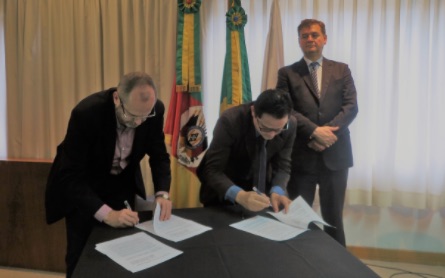. . DEMOCRATIC PARTICIPATION . .
An article from the AJURIS Superior School of the Judiciary of the State of Rio Grande do Sul
On August 11, in addition to marking the 73-year foundation of AJURIS [The Association of Judges of Rio Grande do Sul], as of today also marks a historic moment of strengthening ties between AJURIS, its Judiciary School, the Public Ministry of Rio Grande do Sul and the Canadian institute Terre des Hommes, with the signing of two agreements of inter-institutional cooperation for the strengthening of Restorative Justice and the construction of peace.

The organizations are in unanimous agreement that the country is going through a perioe of great social tension and it needs the promotion of dialogue, accountability and justice for the victims through restorative methods. The event was opened by two pioneers in Restorative Justice studies in the State and in the country, AJURIS vice-president Vera Deboni and Leoberto Brancher, the Coordinator of the Restorative Justice Program for the 21st Century of the Court of Justice of Rio Grande do Sol.
(article continued in right column)
Restorative justice, What does it look like in practice?
(article continued from left column)
AJURIS President Gilberto Schäfer said that the words that best expressed the moment were joy and gratitude for the formalization of the partnerships: with the Public Prosecutor’s Office, for the relevance in the Justice System, and with the Terre des Hommes, an organization present in 36 countries that is internationally recognized for promoting restorative juvenile justice: “We need to think of new ways to resolve conflicts as we are losing the ability to dialogue.”
The head of the Brazilian delegation of the Terre des Hommes Institute, based in Lausanne, Switzerland, Renato Pedrosa spoke about AJURIS which is recognized nationally as a reference in Restorative Justice and stressed that “the prosecution approach this way of doing justice is innovative,” he said, citing the pioneering of State. According to Pedrosa, the partnership is one of the important elements of Terre des Hommes planning, which, until 2030, aims to promote Restorative Justice in Brazil and Latin America.
Representing the Public Ministry of Rio Grande do Sul (MPRS), the Assistant Attorney General for Legal Affairs and coordinator of the Mediar Program, Cezar Faccioli, spoke about the satisfaction of the MPRS in arriving at this moment, in which a major change of culture is being proposed: “We started from a good place,” he said. In Faccioli’s evaluation, restorative methods open “the possibility of consensus and dialogue” and it would be important to include the entire Justice System, including non-state. “Produce justice by making peace,” he concluded.
The Director of the School of AJURIS, Judge Cláudio Luís Martinewski, also highlighted the relevance of the agreements and expressed the expectation that, increasingly, the result of these actions will expand and produce changes in society. The event also celebrated the 13 years of creation of the AJURIS School of Restorative Justice, where Martinewski also formalized the investiture of judges Fábio Vieira Heerdt and Andrea Hoch Cenne as vice-coordinators.